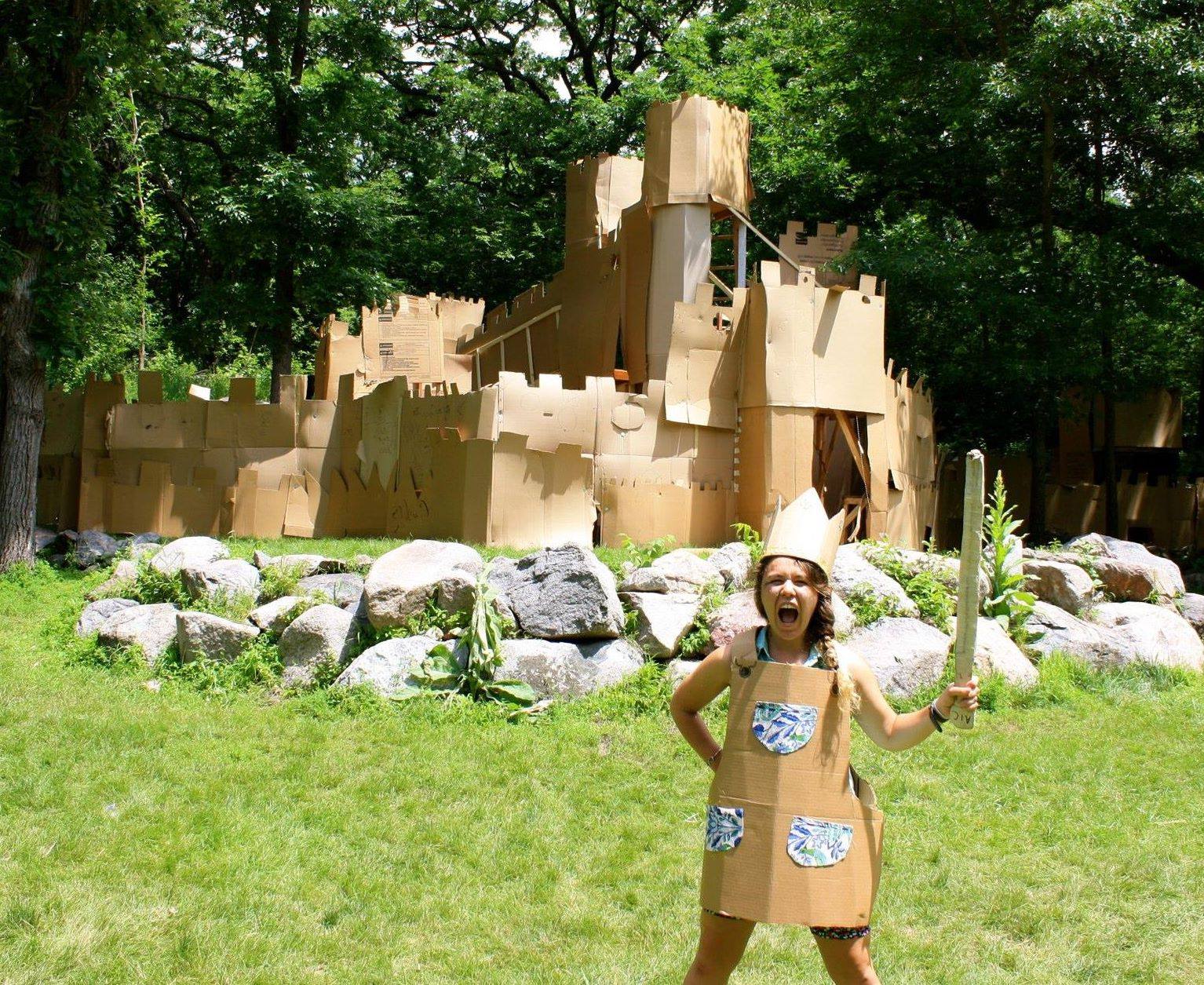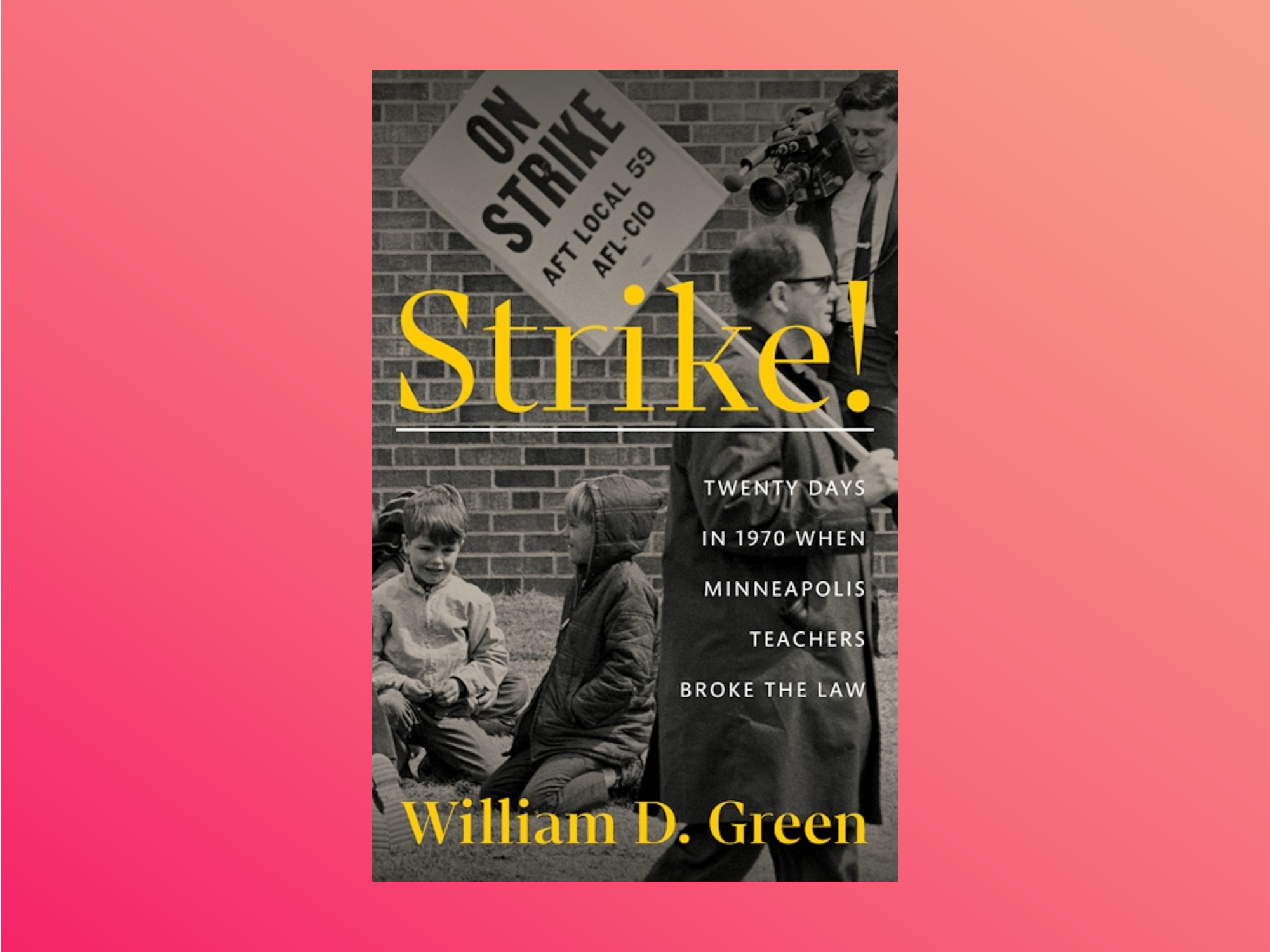Early this year, I blocked out 7 p.m. on Tuesday, January 9, on my Google Calendar with the importance of a job interview or surgical procedure, highlighted the date on my family’s kitchen whiteboard like it was a national holiday, and spent an hour studying a color-coded schedule alongside a Twin Cities road map. All to secure spaces for my three kids at Adventures in Cardboard day camp, the beguiling summer program that takes place at regional parks throughout the Twin Cities.
Highly in-demand, the camp is like a combination Renaissance Festival and waldkita (the German concept of forest kindergarten) that’s centered on activities like roleplaying and cardboard construction. It's run by counselors who resemble the cast of HBO’s Station 11, down to the scavenged costumes, makeshift props, and teetering sets.
I attribute my obsession with purchasing AiC weeks for my kids to the general summer programming conundrum in the Twin Cities. Positive: The metro area houses hundreds of cool camps. Negative: Each cool camp has a different registration date, price point, website log-in, cancellation policy, location, drop-off location, and pick-off time. The staggered registration dates make some camps seem like plentiful and affordable iceberg lettuce and other camps seem like marinated artichoke hearts and toasted pine nuts on the salad of summer programming. Just look at these dizzying, scarcity-mindset-provoking paragraphs from the Minnesota Zoo’s website.
Is any one camp objectively better than the others? Or does limited space and early registration create undeserved hype? I build up this question as a hero’s quest, wherein I’m the protagonist, capitalism is the enemy, and AiC founder Julian McFaul holds the ephemeral answer like a mythological power-granting ring. I glimpsed McFaul once, at a Friday afternoon parent-child battle roleplay that commemorated the end of my kids’ day camp in 2022. In a wooded area near the shoreline of Wirth Lake, McFaul looked slightly elven as he banged on a bass drum, wearing a closed-lipped smile and a skull cap on an 85-degree July day.
I find McFaul-related curiosity seeds everywhere: In the asterisks next to weeks on the AiC summer schedule that designate “Julian is coordinating.” I wonder, What’s so special about those weeks? In a series of mystical communiques sent from AiC headquarters in early January with subject lines like: “Whoops correcting the link in the last email.” Is that a code? In a declarative sentence a counselor, wearing a fairy tale gown, whispered to a camper asking after a lost lunchbox: “Email Julian.” Can McFaul magically conjure Lost & Found items?
“Email Julian.” Could it be that simple? I email McFaul. He replies, weeks later, dropping another elusive clue: He’s been out of town. Out of town where? Narnia?
During our phone call, McFaul sounds affable and candid. I realize that he’s not really a mystic, a prophet, or even a person puffing himself up behind a curtain, Oz the Great and Powerful-style. Rather, he’s a true creative with an idiosyncratic liberal arts background that includes theater productions and projects that he and his wife, Shelley Chinander, have founded, organized, and produced. He taught high school theater until the requirements to obtain a non-traditional teaching license changed; he volunteered at Heart of the Beast Theater’s May Day celebration, where he learned cardboard building techniques; he then taught cardboard skills at Leonardo’s Basement, an offbeat workshop in south Minneapolis.
“That’s where we made our first castle,” McFaul tells me. And the castle inspired the camp. “I really wanted the kids to have time to dream of stories, action, and adventures in that castle.”
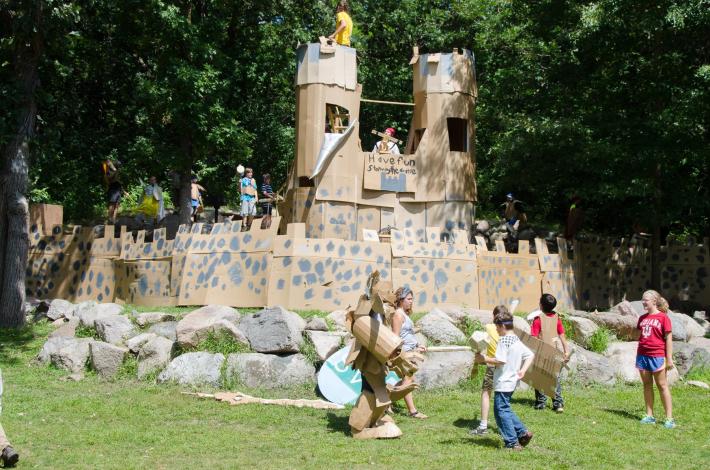
The fantasy aspect sets AiC apart from more conventional day camps. In confirmation emails, along with information about bag lunches and permethrin, the camp includes links to “canon history of the Realm.” McFaul cites J.R.R. Tolkien’s Lord of the Rings trilogy as major inspiration. “For quick entry [into fantasy],” he says, “everybody seems to understand what an elf is, what a dwarf is, what a goblin is. You can plug into it right away, yet it’s still very wide open. It’s like a template.”
Besides fantasy literature, McFaul cites role-playing games like Dungeons and Dragons as heavy influences in creating Adventures In Cardboard. And, get this: “Open world fantasy games like theHunter: Call of the Wild,” he says. “Amazing artistic teams work to put these games together. So, video games. I hate to say it, but they are artistic masterpieces. Those are a huge inspiration.” I laugh. Contemporary parenting is all about managing screen time. One major appeal of summer camps is that they provide supervised, screen-free time, often outdoors. So to find out that Adventures In Cardboard is based, in part, on video games is like opening up an ornate treasure chest expecting priceless antiques and finding, instead, a scowling Minion Happy Meal toy.
If I have a criticism about AiC beyond its participation in summer programming scarcity, it’s that it’s super white. Before I ask my timidly prepared question about why AiC seems perfect for the now-defunct Stuff White People Like blog, McFaul explains why the lore skews Eurocentric.
“I have a deep love and knowledge of West African and Central American fantasy and tradition, but that’s not my background,” he says. “When I’ve tried to go there before, a little bit, I’ve been challenged by staff of color. If staff from those backgrounds with knowledge want to create it, I will help at the first hint. Counselors leave their stories and mark on camp.”
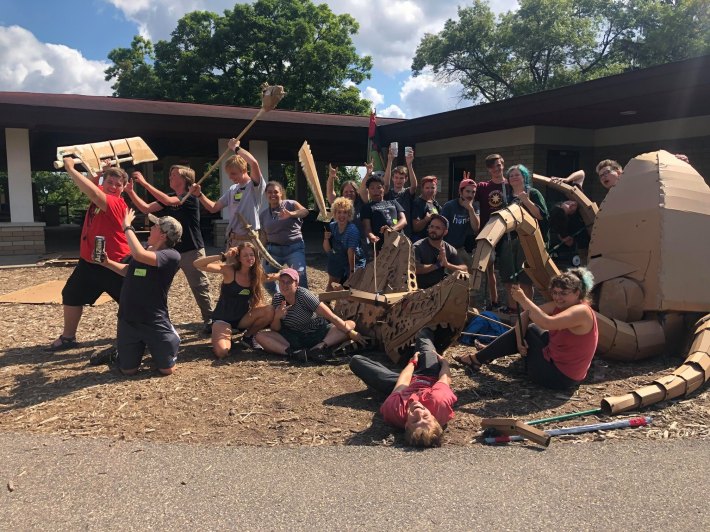
McFaul describes the parks where AiC sessions take place as “a wealth of green space”: Theodore Wirth Park in Minneapolis; West Bush Lake Park, Moir Park, and Nine Mile Creek in Bloomington; French Regional Park in Plymouth; Tony Schmidt Regional Park in Arden Hills; and Caron Park in Northfield. Spring Lake Park Reserve in Hastings, a new location this year, has an, “expansive system of trails right by beautiful bluffs and huge rolling fields in an old growth oak savannah so they're all shaded,” McFaul says.
AiC has dabbled with programs in other places: New York, New Orleans, and Montana. But, McFaul says, outside of Minnesota, “People are like, ‘You wanna do what?’” Whereas, in Minnesota, “People are like, ‘Sure, it makes sense to me.’” When he remarks on Minnesota’s unique openness to a strange, roving summer camp built out of refrigerator boxes, I feel a tingle of regional pride, the same as when I see historical maps that illustrate Minnesota’s wholesome quirkiness, like the 1984 electoral college map where the North Star State stands alone, clad in Mondale-majority blue; or the 2022 state marijuana laws illustration, with Minnesota highlighted as the anomaly that legalized recreational edibles only. Maybe it’s not just that AiC is special, but my Minnesota parental brethren are special, too.
I wonder, perhaps, aside from the fantasy and special outdoor spaces, if the staff are the secret to the camp’s popularity. McFaul describes what sounds like a high retention rate. “Probably 90% of staff come back.” And who are they? College kids, coaches, and professional artists. People with, McFaul says, “skills in theater, coaching, visual art, or gaming. All of those are applicable. As long as they can be appropriately silly. We want kid experience, kid charisma. People who have developed a behavior management style set that works with our philosophy.” Any alumni? “Three of our coordinators right now that run camp started off as campers 12 or 13 years ago.” My kids came home from Adventures In Cardboard sounding like faux Renaissance Fair buskers. Are accents required? McFaul says no: “One year Rachel offered a formal workshop in accent creation, but it’s not something we necessarily schedule.”
When I ask McFaul to expand on the camp’s philosophy, he says that the structure is what makes kids feel autonomous and independent. “High design allows for minimal structure,” he continues. “We have a perimeter of safe play within which anything can happen, as long as it's consensual.” AiC staff adhere to the adage “show, don’t tell.” Demonstrating is more effective than shouting out rules.
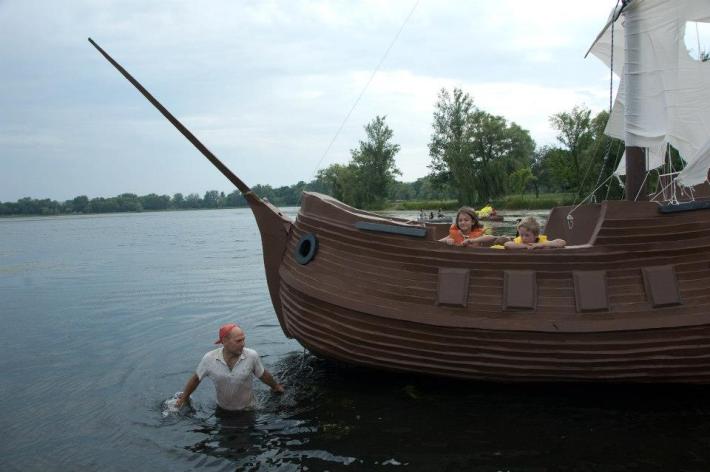
I broach registration night. McFaul says that, to address the demand for more sessions, AiC is adding the Spring Lake Park location and methodically expanding their staff. Besides McFaul and Chinander, they’ve added five year-round part-time staff. “We've been trying to expand for a few years,” he says. “We have to be really careful about it.” He says that this year will be a “huge training year,” making sure that all staff members feel solidly confident in Adventures In Cardboard policies, best practices, and safety and emergency procedures to really nail the camp’s philosophy of openness. “It will involve a lot of play, actually, to get the spirit right this year,” McFaul says.
Mindful expansion sounds great, in theory, but I wonder what it means for me, personally. Will mindful expansion ameliorate registration night stress? I needle McFaul, asking if the early January date creates unnecessary frenzy? “I never wanted to open camp registration so early but it was like a screaming requirement,” he says. “We almost felt pressured into it. I hate that it’s so hard and difficult. We’ve got some ideas about how to change it, but you’re just sacrificing one inconvenience for another.” McFaul confirms what I’m starting to suspect, that instead of a magical, ineffable spell causing AiC popularity, it’s just basic economic principles. “On some level,” he confirms, “it’s just supply and demand.”
During the worst of the COVID-19 pandemic, the all-outdoors aspect of AiC made it a popular choice among Twin Cities parents who wanted childcare or enrichment for their kids, while limiting risk of exposure to the airborne virus. But now that climate change is ramping up weather-related airborne health hazards like wildfire, I wonder if AiC popularity will wane. McFaul counters: “We can move camp indoors, so that’s the plan. This year we will have all days covered [with indoor contingency sites].” I ask about their heat threshold. McFaul replies, “We’ve never closed camp down for heat. If the heat index rises above 115°, we’ll have these indoor contingency sites.”
Before our pleasant conversation concludes, I ask McFaul what he thinks makes AiC so appealing. He talks about the unique alchemy of imaginative roleplay: “Kids are powerless creatures, in some way. Often they're not allowed to feel powerful. But when you're out on the trail and you have a little piece of armor on, you've got your cardboard swords strapped to your side. It seems like you're all alone and things can come out of the woods and get you and kill you. You feel powerful. If it's within this perimeter of safe play, we let them do whatever they want in this co-created world.”
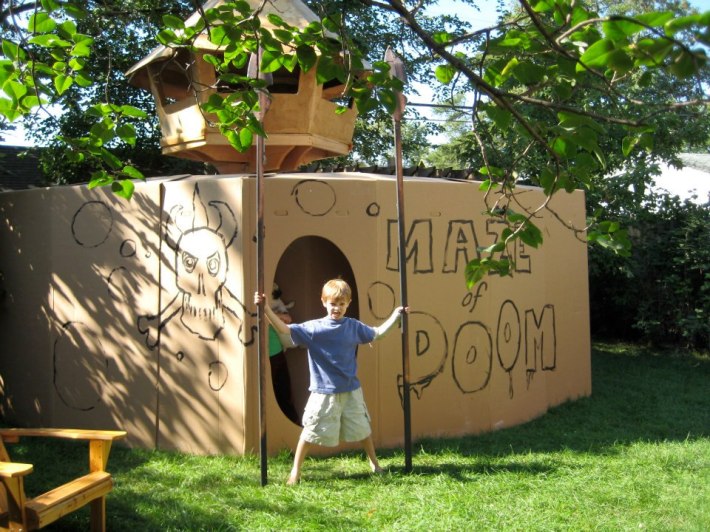
I feel disappointed. Maybe it’s the climate change talk. Maybe it’s because I don’t discover any secret to AiC, other than what anyone who’s taken Econ 101 or listened to a Dave Ramsay podcast could identify. Maybe it’s because I can’t force McFaul into any children’s literature archetype. He’s just a thoughtful artist who, boxed in by conventional career limitations, took the walls of his professional constraints and turned them into a castle, the centerpiece of a weird and wonderful summer camp.
When I think back to registration night, which took place during our only real week of winter weather, and my desperate determination to buy Adventures In Cardboard spots for my kids this summer, I realize that I, too, am a powerless creature, just like that kid in the woods. Most parents are, especially when it comes to climate change threats like extreme storms, heat domes, wildfire smoke; and societal threats to our children’s development, like ubiquitous screens and creeping facism. But when I’m wielding my finger on the touchpad on my laptop on a dark winter night, purchasing a place for my children in McFauls’s co-created world, even if it’s just from 9 a.m. to 3 p.m., Monday through Friday, for one week out of the summer? I feel thrilled with that. I feel powerful.
